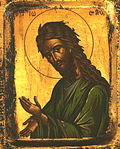One common characteristic of prophetic leaders in Israel—from Moses to John the Baptist—is their reluctance to take on a task which promised little in the way of comfort and much in the way of hardship. Moses, having grown comfortable tending his father-in-law’s sheep, tried to negotiate his way out of his call to be Israel’s deliverer. Amos, also, would have been content to remain “a shepherd and a dresser of sycamore trees.” Jonah had to spend three days in the belly of a fish before being convinced to go to Ninevah. Jeremiah thought himself too young to be taken seriously. Even Isaiah, before saying, “Here am I. Send me,” was overwhelmed by his unworthiness to stand in the presence of God.
Prophetic leaders are, first and foremost, empowered by the Spirit of God to speak the truth boldly and rebuke vice even, and especially, to the religious and secular power brokers who, more often than not, have ascended to their positions through means other than divine appointment. To the Herods and Caiaphases of his day, John the Baptist was seen as a threat not because of his fiery preaching or immense popularity. Rather, he was a threat precisely because he was being faithful to his calling. He was a prophet sent from God to prepare God's people for the coming of their true King and High Priest, that is, the One who would embody everything the religious and secular establishment was not.
In Mark's Gospel, John is presented, very much in the vein of Elijah, as one who simply "appeared, baptizing in the wilderness and proclaiming a baptism of repentance for the forgiveness of sins." But, for all the attention he garnered, he wanted to shift the focus elsewhere. "After me come he who is mightier than I," John declares, "the strap of whose sandals I am not worthy to stoop down and untie. I have baptized you with water, but he will baptize you with the Holy Spirit."
In an age where pride and arrogance are celebrated as virtues, it is essential that we as Christians keep our focus on God, not ourselves. John the Baptist is a perfect model for us in this regard. For all his fiery preaching, he remained the humblest of humble servants, recognizing his role as relatively insignificant in God's grand scheme of things. He had the wildest costume and the strangest diet; he even had some of the best lines. But, in the unfolding drama of redemption, he was a mere bit player whose role would be finished before the end of the first act. Yet, John fulfilled his calling with faithfulness and obedience, calling attention not to himself, but to the One who would come after him.
Such faithfulness and obedience inevitably lead to suffering at the hands of those who jealously guard their positions of power, not because they are servants of God but because they are servants of their own selfish interests. Prophetic leaders put the interests of the kingdom of God before their own interests. Hence, they are willing to suffer whatever slings and arrows are thrown their way. For his faithfulness, John the Baptist lost his life at the hands of a faithless, selfish, and ultimately irrelevant earthly king. Those who follow his example must be willing, likewise, to lose their livelihood at the hands of even lesser characters.

